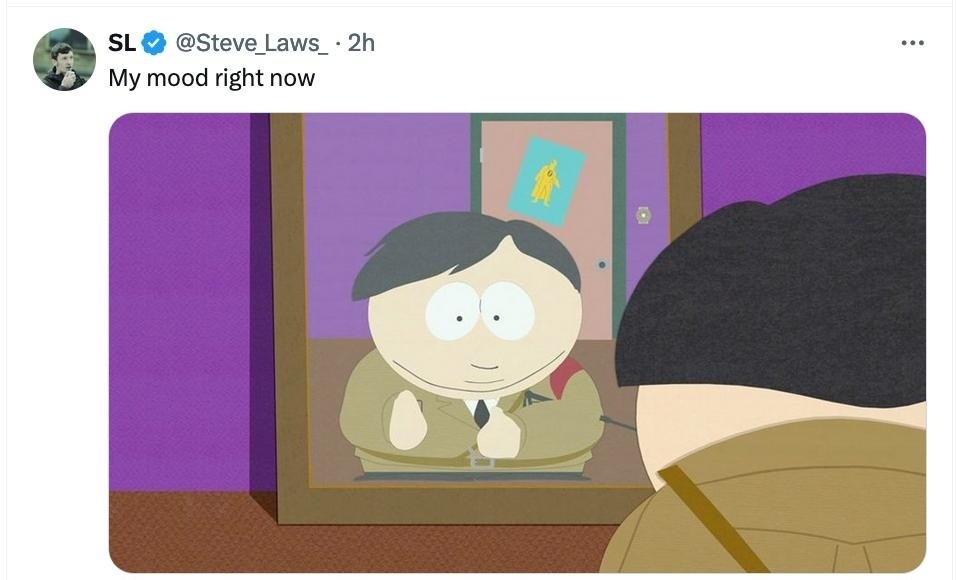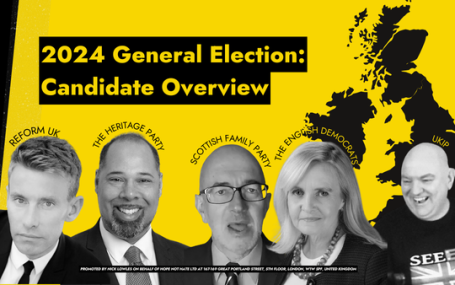HOPE not hate uses cookies to collect information and give you a more personalised experience on our site. You can find more information in our privacy policy. To agree to this, please click accept.
On the radical right, Reform UK has put up a substantial proportion of those candidates, fielding someone in 609 seats — HOPE not hate has revealed many of them to be truly unfit for office. We will continue to examine Reform’s politicians in the run-up to polling day.
A considerably less dynamic picture emerges when looking at the extreme right candidates, who seem to have been caught off guard by the snap election. Rishi Sunak’s announcement that the election would be held just two months after the local elections has prompted a flurry of excuses on the extreme right that they are unprepared, underfunded, and too tired to contest parliamentary races just two months after the local elections.
So while a smattering of extreme right candidates are standing in the general election, a low-energy mood prevails among them. However, a worrying development has emerged from the English Democrats, a nationalist party that has partnered up with Patriotic Alternative, the neo-nazi organisation. More on this below.
The Radical Right
Reform UK
Despite an incredibly chaotic selection procedure — in which we can reveal that the party deselected an astonishing 167 candidates between mid-February and the close of nominations — Reform UK managed to field a surprisingly high total of 609 candidates this year, not far off their goal of running a full slate across England, Scotland and Wales. This marks a huge increase compared to the local elections in May, when Reform entered just 12% of the available seats.
In some places, Reform appears to have reinstated candidates previously removed for unknown reasons: candidates for The Wrekin, St Albans and Wythenshawe and Sale East were all removed from the listings on Reform UK’s website but have ended up on the ballot in those seats.
Some constituencies were harder to fill than others: the party had removed three previous candidates for Suffolk West before finally settling on Reform’s deputy leader David Bull to fill the seat.
There were some notable omissions, however: the party bafflingly failed to put someone forward for Doncaster North, a seat where the Brexit Party got 20% in 2019 and a YouGov poll estimated to have the third-highest potential Reform vote in the country in April this year. The party seems to have never selected a candidate there, and might perhaps have been keeping it free for a senior figure or a defection that never occurred.
However, selection failures elsewhere might work in Reform’s favour: the Conservative Party’s failure to field a candidate in Rotherham leaves the way clear for the Reform candidate, John Cronly, in a seat where the combined Conservative and Brexit Party votes in 2019 were greater than that of the Labour incumbent.
The Heritage Party
The Heritage Party — whose manifesto claims 5G and water-based fluoride are poisoning the country — has put up 41 candidates. David Kurten, having been active in the anti-vaccine and anti-lockdown protest movement, has turned to dabble in antisemitic politics, complaining that a “Jewess” will “rule over” Mexico, and siding with a Holocaust denier. Heritage will hope to improve upon their embarrassing local elections performance — in May, they contested 35 council seats and won a median vote share of 2.7%. Founded in 2020, this is the first general election that Heritage is fighting.
UKIP
UKIP, who last month announced the new leadership of Lois Perry, a climate denial activist, has put up 24 candidates, almost half of the 43 candidates it put up in 2019, and even less than the 378 in 2017. Among the repeat losers standing are Sam Harding (Bromwich), a former candidate in For Britain, the defunct far-right party and Stan Robinson (Llanelli), co-founder of the Voice of Wales podcast, who called for a journalist to be castrated with a “rusty blade”.
Scottish Family Party
The Scottish Family Party, run by the former UKIP candidate Richard Lucas (Edinburgh South West), was launched in 2017 and first ran two candidates in the 2019 election. This year, they are putting up 16 people. In January, Lucas was interviewed by Simon Crane, then an organiser of the neo-nazi group Patriotic Alternative.
Extreme right
The English Democrats
The English Democrats — a far-right party run by Robin Tilbrook — is putting up 13 candidates. This is more than the last two elections, but still considerably less than the 32 candidates they put up in 2015. As HOPE not hate revealed, the English Democrats have struck a secret deal with Patriotic Alternative, the neo-nazi organisation. Tilbrook is paying the deposits and leaflet expenses of PA candidates as long as they stand under his party’s banner. Leader Mark Collett has repeatedly failed to get PA registered with the Electoral Commission, and this has become a sore point among his activists — in part leading to a split last year. Collett felt this deal with the English Dems would placate his remaining members.
There are four PA members standing for the English Dems (read about them all here). Among them are Matthew Darrington (standing in Newark) who is PA’s regional organiser in the East Midlands branch, and Thomas Bryer (standing in Makerfield), who has been active in anti-migrant protests in Wigan. The remaining English Dems are noted failures such as Catherine Blaiklock (Great Yarmouth), the former Brexit Party founder; Stephen Morris (Bury South), and Tilbrook himself (Brentwood and Ongar).
Steve Laws, a far-right activist involved in the “migrant hunter” scene, is contesting Dover and Deal for the English Democrats. He is running an explicitly racist campaign, advocating a policy of remigration, tweeting last week: “The solution is simple. Millions must leave.”

The English Democrats have stood an additional two candidates in alliance with UKIP. Known as “Patriots Alliance”, Antonio Vitiello is standing in Dunstable and Leighton Buzzard and Maxine Spencer in Barnsley South.
The British Democrats
The British Democrats, which splintered from the BNP a decade ago, are putting up four candidates, all perennial losers. Three of them are in the southeast — Lawrence Rustem (Faversham and Mid Kent), Christopher Bateman (Basildon and Billericay), and Gary Butler (Maidstone and Malling). Neither constituency has proved fertile ground for the far-right in recent years — in 2015, for instance, the Monster Raving Loony candidate doubled the vote share of a far-right candidate in Faversham in Mid Kent. The British Democrats are also running Frank Calladine in Doncaster North, which has seen relatively stronger past performances by the BNP. UKIP, and its successor the Brexit Party, have come second or third in Doncaster North elections since 2015, however Reform — for unclear reasons — is not standing a candidate there this year. This election is the first since 2015 that the British Democrats have stood candidates since 2015, when it put up just one.
Independents
A number of far-right activists are standing as independents, as first reported by Searchlight. Andrew Emerson, formerly of the BNP, is contesting Chichester; David Durant, formerly of Third Way, a successor to the National Front; and Ray Brady, who was canned by Reform for posting a video about migrants “chasing the indigenous girls”. Brian Silvester (Crewe and Nantwich), a former candidate in For Britain and UKIP, is also standing for his microparty, Putting Crewe First.
Conspiracy Theorists
The Freedom Alliance, meanwhile, has put up five candidates. Among them are Wesley Massumbukolt (North East Derbyshire), an activist for Students Against Tyranny. The English Constitution Party also has four candidates, led by Graham Moore (Chorley). Under the name Daddy Dragon, Moore smears his enemies online as “Zionists”, not least Tommy Robinson who he has repeatedly called “Tommy Talmud”. Graham Steele of Save Us Now, a tiny and extreme conspiracy theory group, is also running in Gateshead Central and Whickham (having polled just 83 votes in a nearby ward in the local elections). Piers Corbyn, the fantasist brother of Jeremy, is also standing as an independent in Bermondsey and Old Southwark. Andrew Bridgen, who was defenestrated from the Conservatives for comparing Covid-19 vaccines to the Holocaust, North West Leicestershire.
Why the lack of interest?
Britain First, Homeland, the National Housing Party, plus the National Rebirth Party are all sitting this election out. The reasons for abstaining vary from party to party, but combined indicate a lack of resources.
Britain First, as we wrote last month, say they are too tired after the London mayoral race — their activists and donor base are both exhausted.
A single parliamentary election deposit costs £500, which candidates lose if they poll less than 5%. The cost, plus the time spent marshalling activists still exhausted from local election campaigns, plus the resulting embarrassment that comes from being beaten by a joke candidate (Nick Scanlon of Britain First lost to Count Binface in the London mayoral race last month) has likely put parties off.
The National Rebirth Party, which as recently as May 15th was collecting donations for a forthcoming election it expected at the end of the year, about-turned when Rishi Sunak announced a snap poll on May 22nd. Leader Alek Yerbury wrote:
“The bottom line is, that even if today we could take every single resource available to British nationalism, from every party on the table, it would still be so weak that we would be throwing ourselves against the barricade for nothing.”
Pat McGinnis, head of The National Housing Party UK, said his party was “too small”, adding: “It’s not worth standing in parliamentary [sic] until you’re well represented in that area by local councillors first.”
Homeland, which spent a lot of time and energy trying and failing to win a council seat in May, posted online that it would instead focus on a long-term strategy, hoping for a Conservative loss that would open up “areas of debate that have been closed to us”.
There is a prevailing view among the parties refusing to engage in the election that a Labour victory is all but certain. Some organisations are perversely looking forward to such an outcome, predicting that a badly-run government under Keir Starmer will lead to a boost in support for far-right parties.
Referring to a Labour victory in a livestream last month, Britain First’s co-leader Paul Golding said:
“It will be a great thing for us… You’re going to have a crisis of democracy in this country. The situation is going to get far more extreme, and people are going to start voting more extreme. That’s what’s going to happen.”
Mark Collett, leader of Patriotic Alternative, has repeatedly failed to become registered with the Electoral Commission, released a video last month entitled Is the Electoral Route a Dead End? In it, he argued that the political system and the media were stacked against far-right parties, whose potential voters were distracted by “safety-valve parties” such as Reform UK, which he claims are controlled by the establishment. Collett described a feeling of dejection on the campaign trail that will be familiar to any far-right activists seeking public office:
“If you’ve ever knocked on doors, they will throw this in your face: ‘You’re a small party, you’re not going to win, why would I waste my vote on you?’”
Recruiting enough activists to canvass an area the size of a parliamentary constituency when parties have proven themselves incapable of even winning a council ward is a hard sell. Coupled with an indifference that some organisations have towards electoral politics, the impact of extreme right parties at the ballot box this year is likely to be limited.

We are raising funds to launch a Radical Right Monitoring Unit. With full-time researchers and the latest technology, we will proactively uncover, unmask, and hold accountable figures of hate.
Please contribute to this vital work.

When voters go to the polls on July 4th, they will choose between a record number of candidates. This year, 4,515 people are contesting parliamentary…